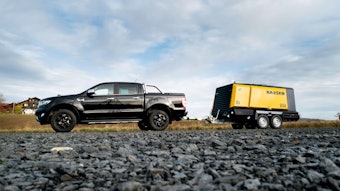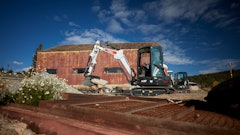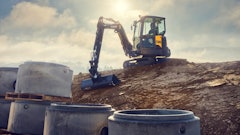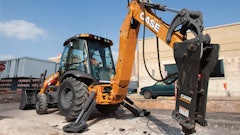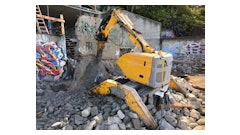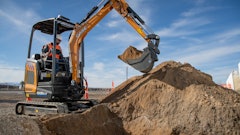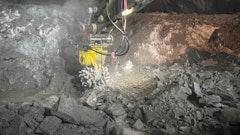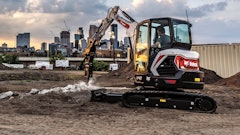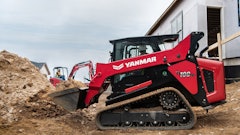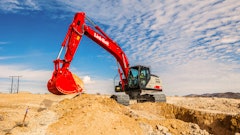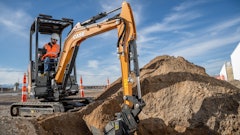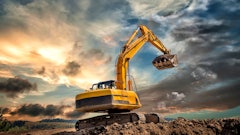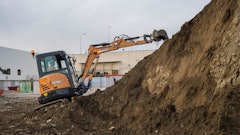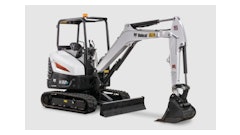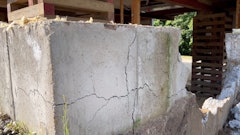
Mini excavators’ compact size and versatility make them a popular choice for the construction industry. There are a large variety of attachments available allowing them to tackle almost any task on the jobsite. Although choosing from so many different models and configurations can be a challenge, one of the biggest decisions contractors may face is whether to rent or buy the mini excavator.
On average, about 25% of contractors choose to rent their mini excavators, while 75% choose to buy the machine. Some businesses get the best of both worlds by purchasing the mini excavator size class they use most frequently and renting additional machines during busy seasons to supplement their fleet. While there are benefits to both renting and buying, there are details to be aware of to determine which option will offer the greatest return on investment (ROI).
When Renting a Mini Excavator May be Best
There are several reasons an operator may choose to rent a mini excavator instead of buying it. With a relatively low upfront cost and flexibility to return the equipment at any time, contractors can reap many of the benefits that come with owning a mini excavator. Whether it’s to save money during a slow economic period or to increase productivity on a quick-turn project, certain conditions warrant a strong rental consideration.
It’s a Short-Term Task
Assess the utilization needs before deciding to buy or rent a mini excavator. If this is a short-term task and the machine won’t have many uses afterward, renting can be a better choice. To better understand what qualifies as a short-term task, estimate the machine’s annual hour usage and the amount of revenue that it would generate. Is that significantly less than what it would cost to buy the mini excavator? If so, renting may be the best option.
Money Is Tight
Buying any capital equipment requires a substantial financial investment, so opting to rent provides an economical alternative for those looking to save on upfront costs. Depending on the amount of time the equipment will be used, the cost of renting a mini excavator can be significantly less than the purchase cost, which can translate into thousands of dollars of savings. Renting a mini excavator also means there’s no need to worry about insurance costs, interest allocation or the sales tax that comes with purchasing a mini excavator.
You’re Looking for Less Commitment
The beauty of renting is that operators aren’t chained down to one machine. Since there’s no long-term commitment involved, rental contractors can change out machines based on the projects that arise or new configurations introduced to the market, instead of finding attachments for their existing fleet or purchasing additional equipment.
Maintenance Is a Pain Point
When renting a mini excavator, most if not all, maintenance and service requirements typically fall under the responsibility of the rental center. This means contractors can focus on the job at hand without worrying about scheduled downtime for servicing. Renting can also be a benefit if unforeseen challenges arise with the machine where repairs are needed. Instead, contractors can simply return the unit and obtain a comparable replacement.
When Buying a Mini Excavator May Be Best
Although renting a mini excavator involves less time, upfront costs and maintenance, purchasing a mini excavator as a long-term investment is sometimes the better option. With benefits such as having full control over when the machine is used and maximizing ROI with different attachments, buying a mini excavator can be an excellent strategic move for a business. This is especially true in market conditions with high economic growth. Here are some indicators buying a mini excavator is the best choice for you.
Future Utilization Opportunities
Similar to determining if renting is best, it’s important to look at the big picture when considering buying compact equipment. Buying often comes with financing payment cycles that can last several years so looking ahead at future utilization opportunities is critical to determining return on investment. For example, if the monthly bill for the equipment is $1,200 and you’ll be working enough billable hours to cover that cost or more each month, buying is likely the best long-term choice.
More Flexibility With Scheduling
Contractors that work in a variety of industries such as utility work, residential and commercial construction, roadwork and municipality projects should consider buying a mini excavator instead of renting. With the versatility mini excavators provide when paired with different attachments, the equipment can easily be used in multiple jobsite applications, which means the benefits of owning one are even greater for businesses that do it all. Purchasing also means the machine is available 24/7 whenever the contractor needs. With renting, there’s always a risk that the rental company won’t have the right machine available when it’s needed, but those who own their own equipment can have peace of mind knowing they are ready to go when the work comes in.
You’re Consistently Renting the Same Size Machine
If renting a mini excavator originally seemed like the best solution but you now find yourself going back to the rental center to use the same machine time and time again, it may be time to buy. Those who rent the same size machine multiple times per year fall into this category, as well as contractors who find themselves using their mini excavator rentals longer than expected instead of switching it out for different equipment with each new job. Additionally, purchasing a mini excavator gives contractors the option to sell the machine and make money back if they find they no longer need it.
The Dealer Offers Rental Purchase Options
For contractors who know buying a mini excavator is in their future but can’t get financing upfront or don’t know which model to buy, rent-to-buy programs can be an ideal solution. These programs allow contractors to start using the equipment right away and rent until they get approved for a loan or find the right model that they want to invest in.
The Equipment Has Reputation for Quality
Investing in high-quality new equipment often brings the added convenience of two to three years of minimal maintenance. Along those lines, if the new machine comes with a better-than-average warranty, that’s a sign the manufacturer believes in the quality of their equipment and it’s likely worth the investment. Some manufacturers offer warranties for new machines as long as 4-years/4,000 hours – double that of many other manufacturers.
Telematic Programs Are Offered with Purchase
One of the newer benefits to buying a mini excavator are telematics programs. Some manufacturers will offer the technology free for a limited time with the purchase of the machine. Telematics can help owners stay on top of service tasks by tracking maintenance intervals and inspection items as well as detecting errors on the machine and sending information directly to service personnel to streamline the diagnostic process. Additionally, telematics systems can include integrated theft protection, real-time operational status of the machine and other helpful data that can improve jobsite productivity over time.
Just as it’s important to examine factors such as market conditions when determining whether to rent or buy a mini excavator, it’s also helpful to have a good understanding of inventory. Supply chain issues can have a negative impact on availability. This can influence the purchasing decision based on what is currently available from the manufacturer. It’s worth reaching out to trusted dealers to discuss options or to learn about different rental and purchasing options. It also pays to look into the manufacturer and learn about their reputation. Are they known for reliable equipment and warranties that back their promises? That’s a sign their equipment is worth the commitment – whether that be for rental opportunities or investing in ownership.






